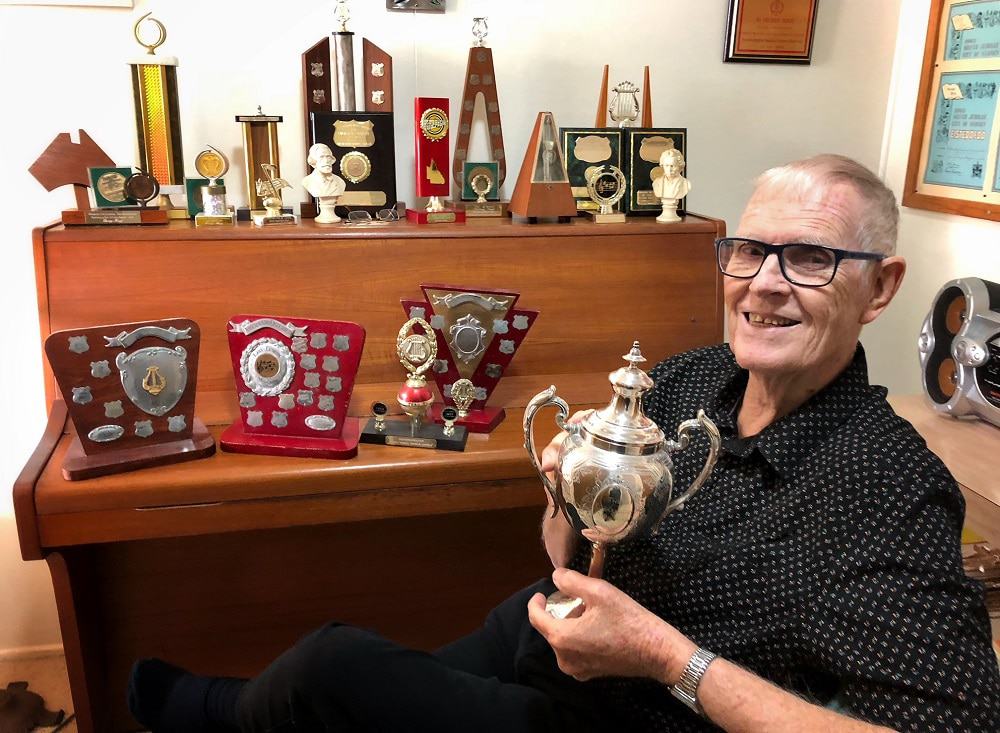Eastern Heights’ George Hogg has been competing every year since 1947.
If you listen carefully this weekend, echoing around Ipswich you may hear the faint sound
of raised voices in chorus.
This weekend in Ipswich, the 125th Queensland Eisteddfod will take place.
The Blackstone Ipswich Cambrian Choir – Champions Commonwealth Eisteddfod, 1910.
The first Queensland Eisteddfod took place in Gympie in 1889. That was 129 years ago.
You will notice a few years missing as the eisteddfod was not held a couple of times due to disastrous events such as flood, measles outbreak and war.
The world in 1889 was a very different place to the fast-paced, social media driven society we now live in.
If you wanted entertainment in 1889, you couldn’t just flick on the TV or turn on a computer game or even jump in your car and head to the movies.
You would attend a concert, theatre or music hall.
Although the world today would be unrecognisable to the first entrants back in 1889, you may be surprised to discover that the songs, talent and the eisteddfod structure is as it was back then.
To this day the Welsh national anthem – Hen Wlad Fy Nhadau (Land of my Fathers) – is sung in the welcoming ceremony. The Gorsedd prayer is recited and other welsh hymns are sung. The Welsh dragon emblem is the emblem for the Eisteddfod Council of Queensland. The Welsh system of moving the Eisteddfod in a circle is still how it is allotted today.
The Welsh community has a very long history of formidable choirs and many had formed in mining communities throughout Queensland.
Ipswich’s first eisteddfod was on New Year Day in 1887. Two Blackstone choirs competed. In 1889 the Blackstone and Ipswich Cambrian Choral Union competed in the state eisteddfod and won the two chief choral events, the main prizes being twenty pounds.
This choir is still performing today and is reputed to be Queensland’s longest continuously performing choir.
George Hogg first competed in the Queensland Eisteddfod as an 11 year old boy, 71 years ago.
He won.
He has been competing ever since.
“I’m 82 and I’m still at it,” Mr Hogg said.
“My whole family were singers and I have been singing virtually since I was born.
“I have been singing and competing at eisteddfods all around Australia and even in Wales, my whole life.
George Hogg’s two first prize certificates on his wall from 1947 and 1949.
“It’s an emotional experience to perform and that feeling of performing on stage and singing, it never leaves you. Your voice may deteriorate over the years, but the feeling it gives you never changes.”
Mr Hogg is also the president of the Eisteddfod Council of Queensland and he believes the eisteddfod gives everybody the opportunity to perform and be given constructive criticism to improve.
“It also instils a self confidence in people to stand up in front of an audience and sing. It takes a certain amount of bravery,” Mr Hogg said.
“That will stay with them right throughout their lives, giving them more confidence to present themselves, whether it be in a job interview or speaking in public for whatever reason.”
From March 30 – April 1 at the Ipswich Civic Centre the 125th Queensland Eisteddfod will be on. There are over 500 entries in 51 categories.
You can see it all for $30 or $20 if you are a pensioner.
For more information click here.
Ipswich has a long and proud history of performing arts and eisteddfods.
Each year thousands of talented performers gather, eager to compete in a wide program of choral, vocal, instrumental, dance and speech and drama sections.
The Queensland Eisteddfod is believed to be the only eisteddfod in the state to boast an adult choral section. This week long celebration is held in a different major Queensland city every year, and its return to Ipswich is certainly welcomed by the community.
As a passionate advocate for the performing arts and a keen performer myself, I always thoroughly enjoy the event

